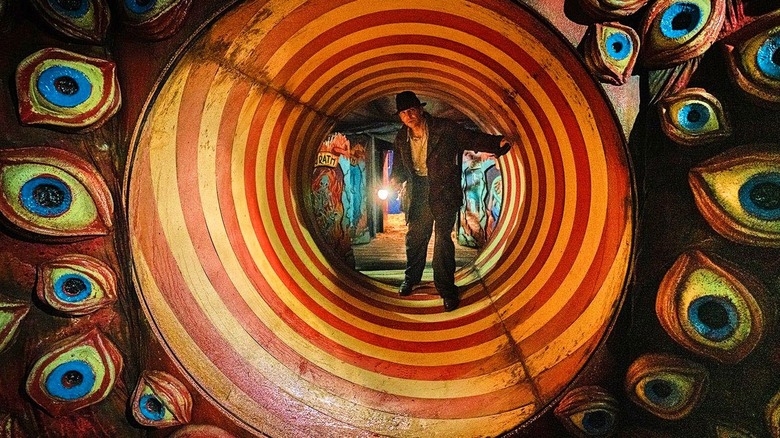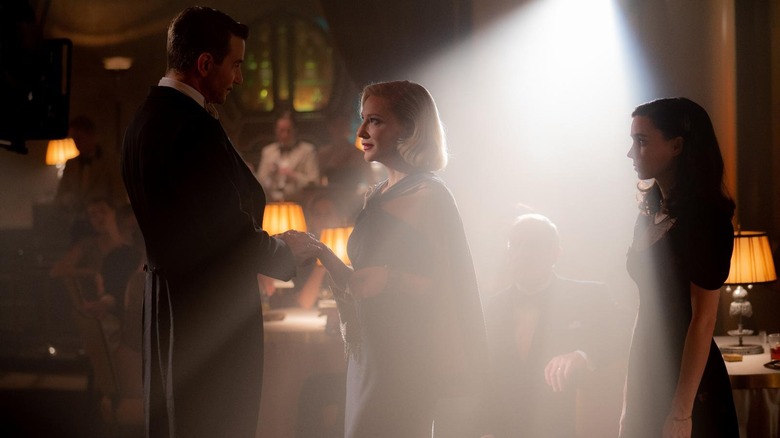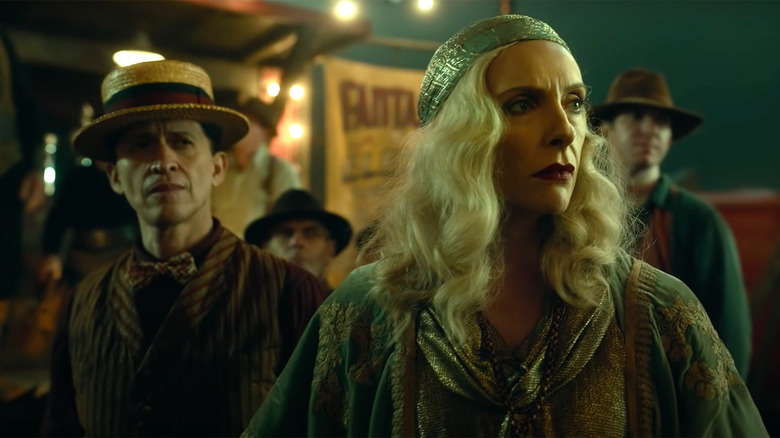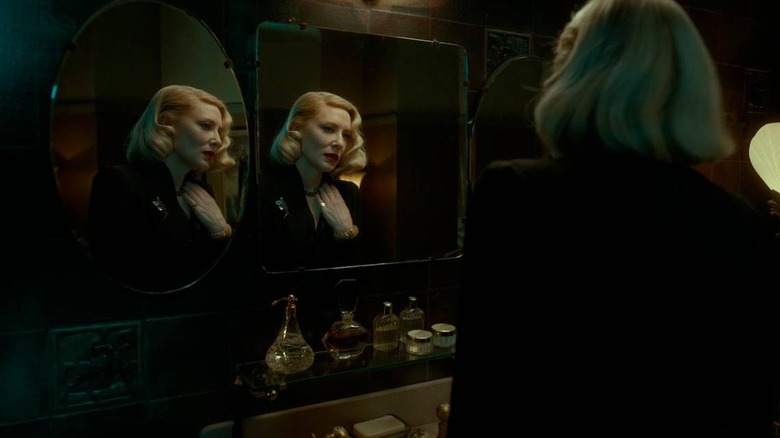Nightmare Alley Composer Nathan Johnson On The Music Of 'Con Men And Hucksters' [Interview]
Nathan Johnson is known for one of the great film noir scores of this century, Rian Johnson's "Brick." Now, the composer behind that cult classic and "Knives Out" has scored another film noir, "Nightmare Alley," that's destined to last. However, Johnson didn't approach the music for Guillermo del Toro's lavish film thinking about genre, but only about the characters on screen.
Johnson had quite an electric bunch to help bring to life, starting with the mystery man at the center of the story, Stan (played by Bradley Cooper). The huckster raises more questions than he does provide answers, and Johnson wanted to keep that mystery alive and at the forefront of the film.
"It's all about masks"
A lot of people have said del Toro is very specific but very open to experimentation. Was that your experience scoring "Nightmare Alley"?
Yeah, he is an ideal collaborator in that he has a very clear idea of the story that he is telling. At the same time, he wants all of the people he is working with to bring their interpretation to the table. So early on, he just kept saying, "I trust your instincts, I want you to do your thing. I almost don't want to tell you too much." It was such a gift. The first time I saw the movie was totally dry, no music. And I read the book after the scoring process. So it was sort of coming into the movie with a blank slate in a way, and just getting to respond to what Guillermo had made, what these incredible actors were bringing to the table, and what these incredible craftspeople were bringing with the set design and the costumes and the production design, just quite an amazing world to get to be a part of.
Like you said, del Toro trusted your instincts. What were your initial instincts for the score?
The earliest instinct was related to Stan. I think what's really interesting about his character — as opposed to most sort of Western narratives that we're familiar with, [which are] about character arcs — I realized Guillermo has made a movie about a guy who essentially doesn't change. He keeps on this same track driving down this track, hitting these same doors and he doesn't learn and he doesn't change. He's just incessant.
For me, I immediately thought about this single repeating piano note. It's the very first thing we hear in the very first scene, and it stays there through the whole movie. We kind of embellish it. It gets really big and orchestral, but underneath it all, there's that same note. By the end we strip everything away and we're left with the very same note repeating that we heard at the very beginning. And so, that was my doorway into it. I talked to Guillermo the next morning [after seeing it], we got breakfast and I was like, this is the movie I think you're making, and this is how I think we could approach the score.
What'd you think of the book?
It's great. I don't know how this can be possible, but it's even darker and more brutal than the movie.
How else did you want to convey Stan's sense of repetition and, maybe, emptiness?
With Stan, my approach for him was that it's all about masks. He keeps presenting himself as someone different. He keeps presenting himself as having powers that he doesn't have. There's no magic in this world. These are all con men and con women. These are hucksters. And so for the score, it was about not leaning into the magic of what they're trying to show to people, but just playing that darkness and that ambiguity. There's a lot of ambiguity in this score because I think in a lot of cases, we don't know what's going on under the surface with these characters. There's light and darkness and we're not sure where they're coming from.
"You would never listen to it and think hip hop"
Do Guillermo also tell you not to approach the score like a film noir?
Yeah, we had a conversation about it. I remember talking with some of the music people at the studio about that. And I was like, for me, it's more helpful to not think about this as noir, as any certain genre and just let me score what I feel the movie needs. Guillermo and I talked about that, and I think it's a really helpful term to describe it after the fact. Hopefully, we're making something that maybe exists in that realm, but is kind of speaking to today. Honestly, it's always going to be my default if I can score what the characters are doing rather than trying to reference another thing from our film history.
What about Cate Blanchett's work that inspired your choices?
Here's the story. So I got breakfast with Guillermo. First time we met and we're talking about the movie and he said, "What do you think about Lilith?" I had seen the movie 12 hours prior and I was like, honestly, I don't know. He said, "It's a good answer. I made the movie because of her character." I was like, all right. So I went home and just started writing. And for her theme, it's this oboe line combined with these sort of open dissonant strings, but there's the spine in her theme that has a rhythmic lurch that's more commonly found in hip hop.
Really?
It's not swung and it's not straight. It's kind of lurching between those and you would never listen to it and think hip hop. What I love about music is the music that exists in the margins or in the spaces between. So there's beauty combined with an ugliness. For her character, she's this calm placid surface with all this dark depth underneath it. And Stan doesn't know that. He doesn't recognize that when he first meets her, but it was so rewarding to get to write for her character because there's so much depth there.
Where were scenes you didn't want to score, where the silence was crucial?
A lot of the early time in the carnival. Guillermo and I, a lot of our conversations were like, this is dry, right? The scene where Clem, Willem Dafoe's character, tells Stan about how to get a guy to be a geek. We leave that quiet. That's just living in the harshness of that moment. The chicken pit where we see the geek as we come in on him, let's just leave that alone, too. Let's just let it be dry. Let's let people sit with what this is and not build up this moment.
Towards the end, though, did you want to go big with the score?
Basically the last 15 minutes of the movie until the train car is just all score and Guillermo, when we talked about that, he is like, all right, this is the moment. This is where it all goes off the rails. What's great about getting to score a movie is it's not about how many notes you can put in, and where you put the notes. It's also about that rhythm, and Guillermo said something really insightful. He said, "Characters are king in a movie, but rhythm is queen." It's just about that interplay of where do we pull back? Where do we land?
The movie is a slow burn, so did you want to help create and maintain that rhythm?
Totally. The movie is a slow burn. We don't do a lot up front and we just let us live in that world. But then what's really rewarding is we cut to Buffalo and suddenly we're with a different person, but he isn't, right? But it feels like, oh, this mask appears like a new person. I forget exactly what the line Stan says to Zeena, but it's like, this is what we were doing at the carnival, it's just a different town with different people. And then the movie is essentially this stretch at the beginning. And then by the end, it speeds up. And you're just kind of holding on for dear life at that moment.
"Don't give me a love theme, but you got to break my heart"
By the way, happy to hear that hip hop influenced Cate Blanchett's character.
I love the wonkiness, right? And it's not like I was thinking about hip hop and let's apply this. But as I was playing and finding that groove, it's like, oh, this is a piano orchestral piece. But that groove, a clear place that I see that happens over here in this style of music and to me, that's what I love about music. That's what I love about modern music and classical music is those moments where it's not all dark or all light. It gets to explore those transient areas. This is such a movie that allows for the exploration of these transient moments.
Do you only look at what's on the screen? Do you never seek outside influences?
Yeah, totally what's on the screen for, in this case, and that was a real joy because when they sent me the movie, it was basically done. The first time I watched it, it was so powerful. It's like, this has a point of view. We're all making the same movie. So it was really nice to not be looking at a bunch of other references, but just look at the characters.
Molly is the most innocent character in the film, so how did you want the music to support her?
That was such a fun part. I remember Guillermo saying, "Don't give me a love theme, but you got to break my heart." And so, it was an innocence. It was a very simple melody that evokes this hope. We talked about when Stan first talks to her, he promises her the world and everything in it. And that theme we hear again, when she recalls those lines and we realize this is another lie that Stan has been spinning.
Did you have much time for experimenting?
This was a very quick scoring process. We had about five weeks to do the whole score, so there wasn't a lot of going down alleys and trying things. It was very much like, all right, here's what we're doing. We got to put our heads down and go. But I think, thankfully, I mean Guillermo knew, I said this before, but it felt like we all were making the same movie and that's really, really important, to be on that same page. It's no fun when people are pushing in different directions. And with this whole team, with this whole creative team under Guillermo leading the charge, we were aiming all at the same target.
Why was the schedule that tight?
Well, I got brought in right at the end, there was some other scheduling that happened earlier. And so, I actually got to come in after they had started back up after, because there was a long pandemic shutdown and then I got to come in right at the tail end, basically to a finished movie, which was something just amazing that I'd never done before.
So you were really going with your gut.
Yeah, yeah. When I'm working with my cousin, Rian, I'm on set and writing from the early part of "Knives Out," and this was kind of awesome to just be like, all right, this is what it is. It's already full. Part of that, too, is getting to respond to such a finished product. It felt pretty clear to me when I watched it, what the movie was, what it was saying and what kind of score it wanted.
"Nightmare Alley" is now in theaters.



